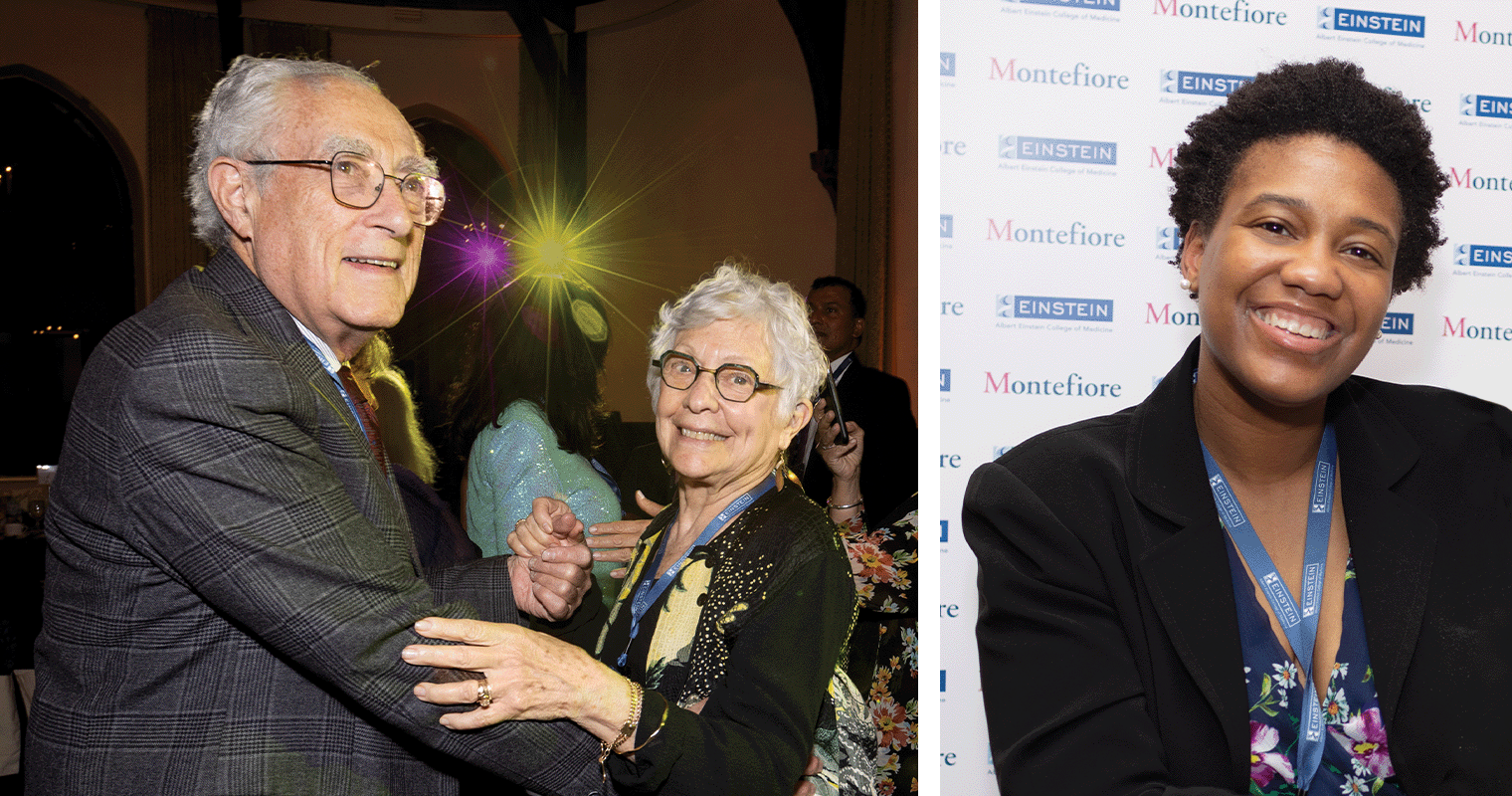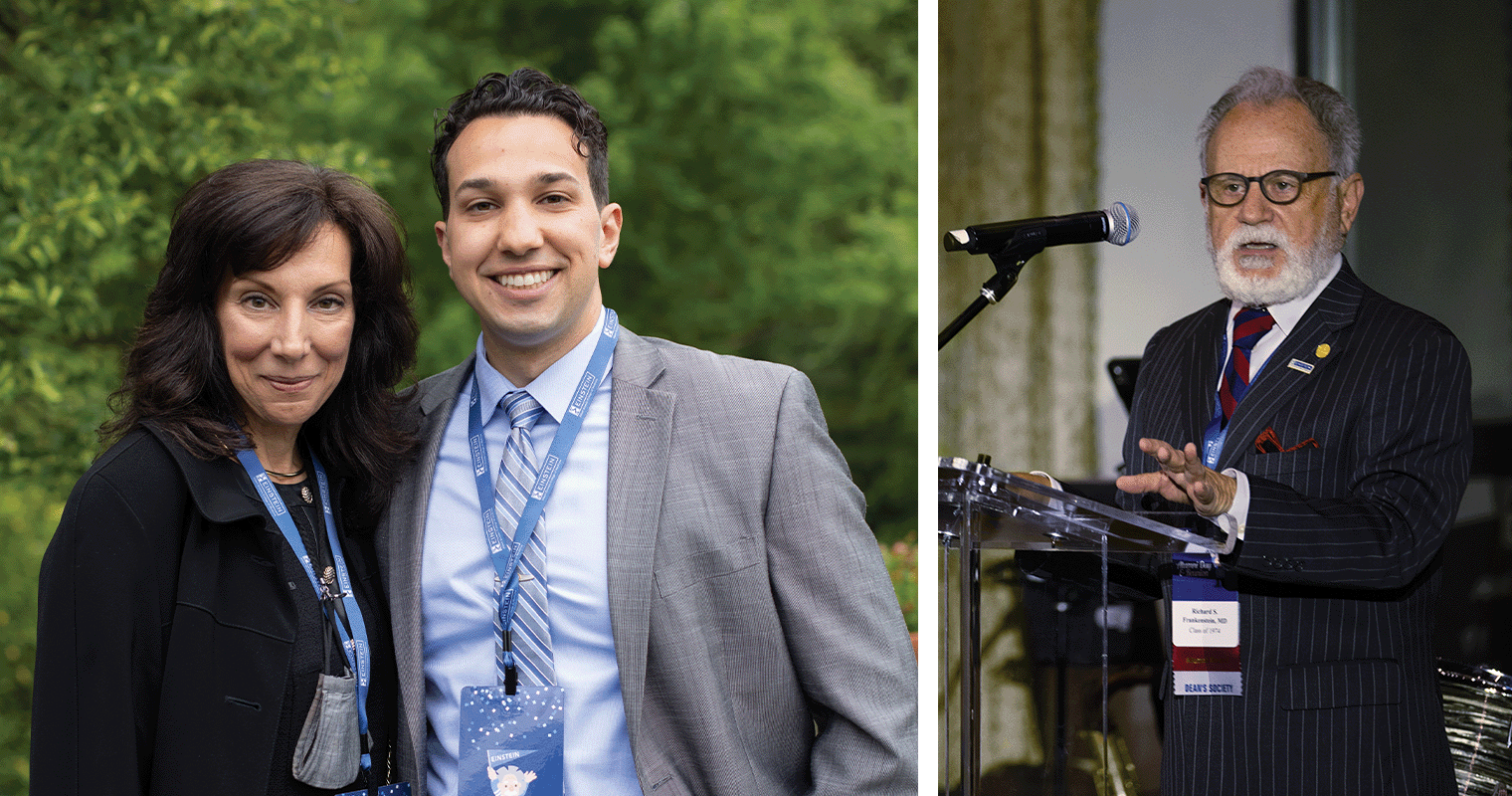
Richard S. Frankenstein, M.D. ’74, has served as an intern, resident, and fellow at Montefiore; practiced pulmonology and internal medicine; and served as the chief medical officer at two California hospitals. He is also a past president of the California Medical Association, the chair of the Joint Commission’s Standards and Survey Procedures Committee, and the governor for Southern California of the American College of Physicians.
Why did you want to be president of the Alumni Association?
Eleanor Roosevelt said, “You must do what you think you cannot do,” and Einstein helped me do that.
How so?
I’m a product of New York City public education. I went to Brooklyn College in a class of 5,000, where you wrote your student number on your exam papers. And Einstein was so different. I had world-famous scientists in the laboratory. Harry Eagle, M.D., who invented a synthetic cell culture called Eagle’s medium, taught me how to administer a smallpox vaccine.
Have there been moments when you’ve since thought, “That’s my Einstein training at work”?
At the University of California at Irvine, a student said, “Our friends don’t do as much work as you make us do.” I said, “I want you to be the best doctors you can be.” And that came from Einstein’s Juden Reed [M.D.] and Phil Rogal [M.D.], who’d say, at the end of the day, “OK, nice job, guys,” and then take us to see patients who had findings we could learn from.
On day one at Einstein you were taught, “Your patient comes first. Before you figure out how to get breakfast, you take care of your patients.” And by the end of your internship year, you were confident you could safely care for every patient you might see. I interned in Morrisania on the inpatient service. On my last night, an emergency room nurse—a real tough lady, six feet tall, who literally knocked heads together—said, “Hey, Frankenstein, I’ve been watching you; you’re gonna make it.” And then I knew I would.
Why should alumni engage with Einstein right now?
At the American College of Physicians, we talk about justice, equity, diversity, and inclusion—JEDI, as we call it. This country has taken some steps backward, but we think that if healthcare can get it right, the nation will, too. Because healthcare is like the Transportation Security Administration line at the airport. Even the rich and mighty have to take off their shoes and walk through. Everyone, sooner or later, needs to see a doctor—and people listen to doctors, especially now.
And Einstein, in particular, can be influential. When I was a student, we were mostly white and Jewish, but it was decided that this should change. The Martin Luther King Jr.–Robert F. Kennedy Program for Special Studies [established in the wake of their assassinations in the late 1960s] was designed to help college students from groups that were underrepresented in medicine prepare for medical school. The program enrolled excellent students—future leaders at many institutions.
Meanwhile, Montefiore and its affiliates basically were the definition of healthcare during the height of the pandemic in the Bronx—the epicenter of the epicenter of COVID-19. During the first wave’s peak, about 2,000 patients per week were being admitted to the health system, and the average resident saw more death than most doctors see in their careers. But our doctors did what doctors do: They cared for patients as best they could, with limited knowledge and at great risk.
So if we can tie people’s respect for doctors to a respect for all Americans, we’ll achieve the vision of America we thought we all believed in—the America to which my Lithuanian and Polish grandparents immigrated.



Governance in medicine has been important for you. Does that come from your commitment to diversity?
As Michael Reichgott [M.D. ’65, Ph.D.], an Einstein dean who took students to American Medical Association [AMA] meetings, used to say, “Watch out for the politics, but learn how it’s done.” Because even though people say, “Oh, the AMA is a very conservative organization,” it has evolved. In 2021 it documented its own history of discrimination and the need for change. And again, that’s because of progress made by trailblazing places like Einstein.
What do you want to achieve as president?
Here’s my vision of a strong alumni connection. A friend of mine died in 2000, and his widow still occasionally goes to his prep school reunions. And she was his second wife, who married my friend decades after he went to prep school!
Now maybe we won’t quite achieve that, but there’s potential for vastly greater engagement. At Einstein, you knew everyone in your class within two weeks, and during the preclinical years, you helped one another in the lab. You leaned on one another the first time a patient died on your service.
But then we got atomized to the wards and further atomized when we spread out across the nation. If Einstein can reconnect people to those intimate friendships, we’ll generate a much greater commitment among alumni. So, for example, EinsteinConnect.org [an online alumni directory and mentoring platform created during the pandemic] not only links students to alumni mentors but also links alumni to one another. It could be even more effective if we trained mentors or expanded our availability to graduates who are wondering about, for example, the climate for a practice in Milwaukee, or whether a specialty is right for them.
You recently made a gift to Einstein to fund scholarships that blends scholarship support with planned giving. Why is that combination important?
Over several years, I’ll create a specific scholarship as part of the endowment, because that’s money in the bank for Einstein and helps students right now. We really don’t want great student applicants to go elsewhere over a “few” tuition dollars that, for them, can be significant money. Professor Albert Einstein said we need a college of medicine that’s open to everyone, and this school is just that. We see that for ourselves each year at graduation.
Explore the Alumni Association’s new online platform: EinsteinConnect.org
Albert Einstein College of Medicine deeply appreciates the generosity of Dr. Richard S. Frankenstein in establishing a student scholarship fund, and his investment in future generations of physicians at Einstein.